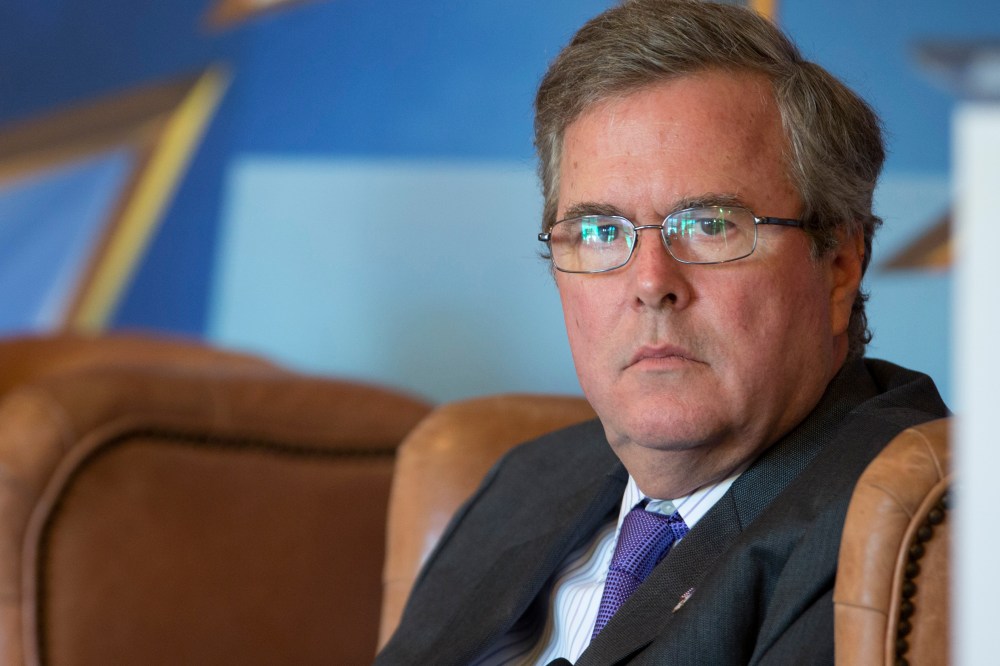Assuming he decides on running for president, Jeb Bush starts 2016 with one huge advantage and one massive weakness and they’re both the same thing: His last name.
The former Florida governor has to carry not one, but two presidencies’ worth of baggage along with him on the trail. His father, George H.W. Bush, was drummed out of office after one term by Democrat Bill Clinton. And his brother, George W. Bush, was hugely unpopular when he left office after two terms in 2008.
Jeb Bush he has his own long and varied career in politics. For better or worse, though, the Bush brand is inextricably linked to his campaign and will play a major role in everything that comes next.
WATCH: Can Jeb Bush get past family brand?
There’s plenty of upside to being a Bush. Family connections helped kick-start Jeb’s political career early on and now they help provide a powerful base of donors, staff, and surrogates. But as Democrats and Republicans alike made clear within hours of his Tuesday announcement, Bush’s critics won’t hesitate to use the same ties against him.
“I don’t think we need another Bush, period,” Oklahoma Senator Tom Coburn, a conservative Republican, told reporters on Tuesday.
On Twitter, the Democratic National Committee debuted an attack you can expect to see daily as long as Jeb openly considers a run for president.
Today Jeb Bush announced he’s considering a run for president in 2016. Our response? pic.twitter.com/LPGhxxSkcc
— The Democrats (@TheDemocrats) December 16, 2014For skeptics on the right in the GOP primary, the Bush name represents an unforgivable tax increase and political disaster under Bush 41 and profligate spending and bailouts under Bush 43. Democrats, meanwhile, are eager to tie him to the Iraq war and 2008 economic meltdown.
Bush’s political arc might have been very different already if not for his brother’s second term collapse. Many observers credit George W. Bush’s struggles with keeping his brother out of the 2008 and 2012 presidential elections, where the Florida governor’s impressive political resume might have stood out. “If his name weren’t Bush, he’d be running for president, I’m convinced,” Mitt Romney told reporters in 2007. “And we’d all have to stand aside because he’d be such a sure-fire winner.”
In 2012, the Bush brand was still weak enough that Republican presidential candidates almost never mentioned his presidency in debates or speeches, opting instead to tie themselves to Ronald Reagan at every opportunity. When the topic turned to Bush, it was usually to highlight their differences — Romney contrasted his position on the auto bailout, for example, while Rick Santorum liked to boast that he challenged Bush on his policy towards Iran.
RELATED: What would a Jeb Bush-Hillary Clinton matchup in 2016 look like?
This isn’t just because they feared turning off general election voters, either. The burgeoning tea party movement viewed itself in many ways as a corrective to the Bush era. It’s impossible to understand the rise of someone like Rand Paul — another likely 2016 candidate and a stinging critic of the 43rd president’s record on civil liberties, fiscal issues, and foreign policy — outside of this context.
The question now is whether enough time has passed that the idea of another Bush is acceptable to GOP voters and independents. Even Jeb’s own mother, Barbara Bush, is uneasy with the idea on principle, if not policy: In 2013 she said she didn’t want her son to run because “we’ve had enough Bushes.” She also told C-SPAN in January that “If we can’t find more than two or three families to run for high office, that’s silly.” She’s reportedly since warmed to the idea.
%22Some%20commentators%20have%20made%20the%20case%20that%20the%20threat%20the%20family%20name%20poses%20to%20Jeb%20Bush%E2%80%99s%20candidacy%20may%20be%20overblown%20given%20how%20much%20time%20has%20passed%20since%20the%20last%20Bush%20held%20office.%22′
Some commentators have made the case that the threat the family name poses to Jeb Bush’s candidacy may be overblown given how much time has passed since the last Bush held office. The Washington Post‘s Nia-Malika Henderson, for example, recently wrote that “the Bush brand is seeing a resurgence” based on George W. Bush’s rising popularity in polls. In a 2013 Gallup poll, 49% of Americans viewed him favorably, a 14% increase since he left office in 2009.
Good news for Jeb, right? Don’t buy it yet. Yes, George W. Bush’s personal image has improved now that he’s the friendly guy who attends nonpartisan ceremonies and pursues a painting hobby. But as Henderson notes, this happens to every president once they’re no longer subject to constant partisan attacks and the public stops holding them accountable for whatever’s wrong in world that day, from Ebola outbreaks to oil spills. Bush’s popularity is still weak in that context.











